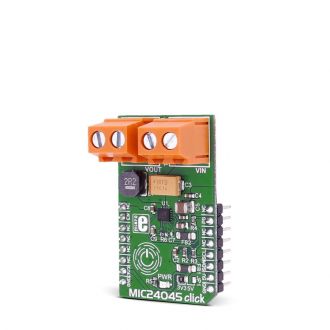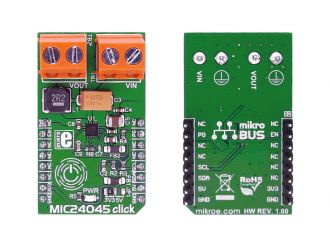
We strongly encourage users to use Package manager for sharing their code on Libstock website, because it boosts your efficiency and leaves the end user with no room for error. [more info]

Rating:
Author: MIKROE
Last Updated: 2022-07-22
Package Version: 1.0.0.1
mikroSDK Library: 1.0.0.0
Category: Buck
Downloaded: 6274 times
Not followed.
License: MIT license
MIC24045 click carries MIC24045 I2C-programmable, high-efficiency, wide input range, 5A synchronous step-down regulator from Microchip. The click is designed to run on either 3.3V or 5V power supply. It communicates with the target microcontroller over I2C interface.
Do you want to subscribe in order to receive notifications regarding "MIC24045 click" changes.
Do you want to unsubscribe in order to stop receiving notifications regarding "MIC24045 click" changes.
Do you want to report abuse regarding "MIC24045 click".


Library Description
The library covers all the necessary functions to control MIC24045 click board. Library performs the communication with the device via I2C driver by writing to registers and by reading from registers. The library has generic write and reads function, get/set the output voltage function, for sets/gets settings, reads the status value, etc.
Key functions:
Examples description
The application is composed of three sections:
void applicationTask()
{
for ( cnt = 21; cnt > 2; cnt-- )
{
vOut = cnt * 0.25;
mic24045_setVout( vOut );
mic24045_enable();
Delay_1sec();
currentVoltage = mic24045_getVout();
FloatToStr( currentVoltage , logText );
mikrobus_logWrite( " Current voltage: ", _LOG_LINE );
mikrobus_logWrite( " ", _LOG_TEXT );
mikrobus_logWrite( logText, _LOG_TEXT );
mikrobus_logWrite( " V", _LOG_LINE );
mikrobus_logWrite( "----------------------", _LOG_LINE );
Delay_1sec();
mic24045_disable();
Delay_1sec();
}
}
Other mikroE Libraries used in the example:
I2CUART​ConversionAdditional notes and informations
Depending on the development board you are using, you may need USB UART click, USB UART 2 click or RS232 click to connect to your PC, for development systems with no UART to USB interface available on the board. The terminal available in all MikroElektronika compilers, or any other terminal application of your choice, can be used to read the message